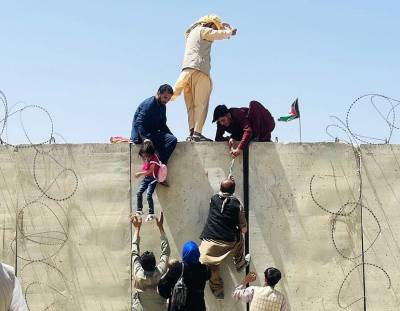Following the swift and dramatic fall of Kabul to the Taliban, the U.S. government and outside analysts are rightly focused on the immediate crisis, including safely evacuating U.S. personnel. When the dust settles, however, it will become clear that America’s loss in Afghanistan will have much more important and far-reaching strategic consequences to which Washington must also attend. Indeed, America’s retreat from Afghanistan risks undermining several of President Biden’s own most important foreign policy priorities.
Biden has emphasized his desire for the United States to resume its global leadership role, repeatedly saying that “America is back.” U.S. global leadership and the stability of the international system depend, in large part, on Washington’s promises to protect friends and defend against enemies. More than 30 formal treaty allies, which combine to make up more than half of global GDP, rely on American security guarantees. If the United States cannot be trusted to keep its word, however, then allies may find it prudent to find other ways to protect themselves and adversaries may see a green light to aggress without consequence.
Unfortunately, the U.S. retreat in Afghanistan will deal a significant blow to U.S. credibility. The United States spent 20 years promising to build a self-sufficient democratic government in that country. It failed. With Washington reneging on the promises it made to the Afghan people for two decades, will others trust its word? NATO allies, which worked alongside the United States to defeat the Taliban and rebuild the country, also felt blindsided by Biden’s decision. Already questions are being raised about American reliability. Rivals in Moscow and Beijing are gloating, and even Washington’s closest friends are concerned. “Whatever happened to ‘America is back’?” asked Tobias Ellwood, chair of the Defense Committee in the British Parliament. “The Western democracy that seemed to be the inspiration for the world, the beacon for the world, is turning its back,” said Rory Stewart, Britain’s former minister for international development.
Beyond lost credibility, there is the status of global democracy and human rights. The emerging Biden doctrine sees a world at an “inflection point” in a struggle between democracies and autocracies. According to Biden, "We must demonstrate that democracies can still deliver for our people. That is our galvanizing mission.”
But in its hasty retreat from Afghanistan, the United States has abandoned a fledgling democratic government and handed power to a Taliban theocracy. The failed democratic experiment in Kabul will rightly lead the Afghan people and others to question whether democracy really can deliver. Afghanistan’s backslide into autocracy will be another data point in worrying trend lines showing a global decline in the number of democracies globally over each of the past 15 years. Taliban rule is already leading to gross human rights abuses on the ground, including executions and rape, and these practices and others, tragically, will likely become the new normal there.
Finally, the Biden administration has vowed to focus on great power competition with China, with Secretary of State Antony Blinken calling China’s rise America’s “biggest geopolitical test of the 21st century.” Some proponents of the withdrawal from Afghanistan argued that this would free up forces and resources that could be directed toward competition with Beijing. But U.S. withdrawal, on balance, will weaken America’s position vis-à-vis China.
The aforementioned battered U.S. credibility will affect Beijing’s calculations about whether Washington has the stomach to defend U.S. allies in the Indo-Pacific, possibly making a Chinese invasion of Taiwan more tempting. Moreover, the United States squandered significant influence in Central and South Asia, with U.S. adversaries Russia, China, and Iran filling the vacuum and forging warm relations with the new Taliban government. Finally, the U.S. military position in the continent will be diminished as it abandons Bagram Air Base and other key military installations, reducing U.S. options for posturing forces against China and the future terrorist threats that are likely to re-emerge in a Taliban-ruled Afghanistan.
The rapid fall of Kabul and disorganized U.S. retreat is an embarrassment for U.S. foreign policy, but, more than that, it severely undermines President Biden’s own foreign policy agenda. After it addresses the immediate crisis, the Biden administration should pivot to mitigating the negative strategic consequences that come from losing America’s longest war. A failure to do so effectively will damage Biden’s agenda and U.S. global standing.
Matthew Kroenig is a professor of government at Georgetown University, deputy director of the Atlantic Council's Scowcroft Center for Strategy and Security, and author of The Return of Great Power Rivalry: Democracy versus Autocracy from the Ancient World to the U.S. and China. Jeffrey Cimmino is assistant director of the Scowcroft Center's Scowcroft Strategy Initiative.






Please note that we at The Dispatch hold ourselves, our work, and our commenters to a higher standard than other places on the internet. We welcome comments that foster genuine debate or discussion—including comments critical of us or our work—but responses that include ad hominem attacks on fellow Dispatch members or are intended to stoke fear and anger may be moderated.
With your membership, you only have the ability to comment on The Morning Dispatch articles. Consider upgrading to join the conversation everywhere.